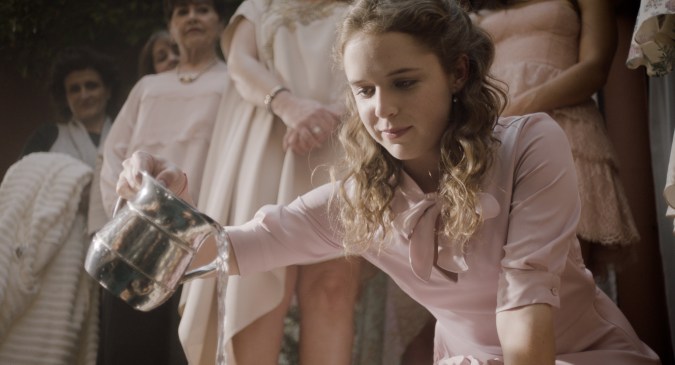At first glance, the Mexican film Leona might seem like a pretty straightforward movie. It follows a romantic relationship that seems to be doomed from the start thanks to the different origins of the two characters. However, there’s much more to it, transcending the premise of the main plot to ask questions about migration, belonging and love.
Leona is the feature-length debut of Mexico City-based director Isaac Cherem. It follows Ariela (played by the film’s co-writer Naian González Norvind), a member of the Jewish community, as she falls in love with Iván (Christian Vázquez), a gentile. A muralist, Ariela doesn’t quite fit in. She refuses to be set up with would-be suitors nor does she conform to the gender roles she’s been taught to play. This anchors the main conflict of the film. Not only does her family reject her relationship with Iván, but they threaten to shun her altogether. This also complicates Iván’s own concerns about his future within Ariela’s family. Leona explores what it means to navigate strict cultural traditions that go against your own desires.
Although Leona is a work of fiction, the situations it presents are based on actual events. Ariela belongs to a community that arrived in Mexico in the early 20th century from Syria escaping persecution, racism and civil war. Like many other Jews in the diaspora, they found ways to survive and prosper in their new homeland, relying on traditions and tight-knit social dynamics.
Leona is concerned with the assimilation of Jewish people to the new society they live in, risking leaving behind their religion and traditions. The members of the Mizrahi community as depicted in Leona are observant of certain aspects of the religious practice: they observe Shabbat, celebrate the mikvah ceremony before marriage (a purification bath for the bride to be) and keep kosher diets. Still, you can see small signs of assimilation here and there: Ariela’s dad favors huevos rancheros, two of Ariela’s Jewish dates invite her to non-kosher restaurants while still avoiding pork and seafood in their dishes, and the nods to mass pop culture like American football and award shows.


In the first act we see that despite getting along with most of the people in her life, she shares little in common with them. Once she meets Iván, Ariela finds herself in another world, quite literally, since she’s whisked away from upscale Mexico City neighborhoods like Polanco and Bosques de las Lomas to the bohemian streets of Coyoacán and Juárez. Ariela glows as she eats tacos al pastor, downs mezcal at cantinas and dances to cumbia into the night. The central theme of the film shifts quickly from a forbidden love story to a question of belonging. Is blood thicker than desire, love and passion?
The characters are portrayed in a realistic way thanks to the use of Mexican slang influenced by Arab and Jewish culture yielding a particularly nasal variation of the posh Chilango fresa accent. The movie favors close-ups with occasional wide shots to give it room to breathe, giving it a naturalistic flair. The only overly melodramatic device is the sparse score by Jacobo Lieberman (Frida, María Full Of Grace, Chicuarotes) which embraces the action in melancholic piano hues, punctuating Ariela’s plight at moments when she feels her free will slipping away.
As most immigrants know, there’s a sense of displacement inherent in one’s experience in relation to the host country. For the Jewish characters in Leona, Mexico is their home yet they carry with them the trauma of centuries of migration. The result is a community that established strict limits on how much they adapt to the dominant culture around them.
Ariela is constantly rejected by her community for who she is and the kind of artist she aspires to be, but she also doesn’t quite fit in with her new social circle, belonging neither here nor there. The question at the heart of Leona is grander: Should you sacrifice your individual happiness in the name of upholding tradition? At one point, Ariela’s grandmother tells her that what she’s feeling for Iván is not worth all the trouble. “It’s not about love,” she tells Ariela. Leona seems to take this pronouncement as both a question and a defiant statement.
Leona is screening at the New York Jewish Film Festival on January 15 and 18, 2020.




